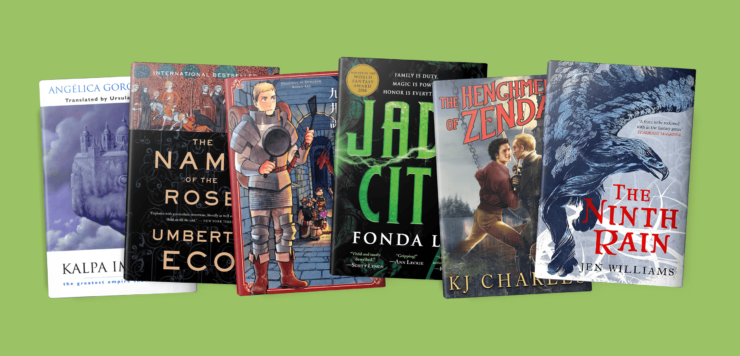It’s never a bad time for adventure fantasy, but I would posit that now is the best time for adventure fantasy.
Here are some of my favourites, hand-selected for escapism, intrigue, high density of swordfights, and sheer enjoyment. Ideal if you have a fire handy to curl up beside. (Yes, I know, it’s May, but surely I am not the only one with a persistent daydream of sitting in a huge wingback armchair before a crackling hearth?)
The Winnowing Flame Trilogy by Jen Williams
I read this trilogy—beginning with The Ninth Rain—back to back, start to finish, something I don’t think I’ve done with a series for years. These books are just terrifically good fun. They reminded me, in the best way, of curling up in the school library and discovering the great fantasy standards for the first time. They have everything I loved as a teenager—mythical beasts, heroic last stands, unfathomable foes—with a fresh modern twist and a pervading sense of humour. But, most importantly, they have sad vampire elves. “Get this—they were immortal—but then their tree-god was killed—so they had to drink human blood to survive!!!”—me, to all my friends, for the past two months. If that doesn’t convince you I don’t know what to tell you. [Editor’s Note: these books are currently only available in the UK from Headline Books.]
The Green Bone Saga by Fonda Lee
Part family saga, part crime drama, part martial arts epic, Fonda Lee’s Green Bone Saga is one of my absolute favourite fantasy series of the past few years. The worldbuilding is intricate but never overwhelming, and Lee deals subtly with themes you rarely see in fantasy: globalisation, diaspora cultures, the transformation of a traditional way of life. If that sounds kind of heavy, do not be deceived: the primary joy in this series is (1) nail-biting duels, (2) the sheer range of awful things that can happen to the Kaul siblings, (3) the fantasy of driving around the city, surveying your territory through the smoked-glass windows of a gorgeous automobile. Jade Legacy, the final book in the trilogy, is out next year and I cannot wait.
Kalpa Imperial by Angelica Gorodischer
Something between a novel and a short story collection, Kalpa Imperial explores the history of a vast imagined empire through a series of loosely connected vignettes. The stories are—by turns, and sometimes all at once—funny, brutal, cynical, optimistic, bizarre and delightful. You get the sense of exploring an immense half-forgotten ruin. One to read and re-read.
The Name of the Rose by Umberto Eco
“But this is a work of literary historical fiction,” I hear you cry. I mean, yes, but it also has murders at a remote abbey in the snow, a haunted non-Euclidean library, and one bit where the adorably hapless narrator describes a lavish altarpiece for three or four pages. Speaking of the narrator, Adso of Melk is the sweetest and most useless monk of all time, although I suppose it’s not his fault that he spends all his time with Monk Sherlock Holmes. Great stuff. If you want to learn a great deal about fourteenth-century heresies, you can keep Wikipedia open in a tab, but it’s definitely not mandatory.
The Henchmen of Zenda by KJ Charles
The legendary Victorian pulp The Prisoner of Zenda is an account of a British traveller who must pose as the King of Ruritania in order to foil a dastardly plot. The Henchmen of Zenda reimagines the story from the villains’ perspective—always one of my favourite conceits. The winningly salty Jasper Detchard’s take on the evil scheme includes intrigues within intrigues, kidnap, blackmail, murder, and his offbeat romance with the dashing Rupert von Hentzau. Pure delight.
Dungeon Meshi by Ryoko Kui (aka “Delicious in Dungeon”)
This manga starts with a great premise for jokes. What if an adventuring party had to resort to cooking and eating the monsters in the dungeon they’re exploring? Cue lots of scenes where they have to figure out how to cook mandrake, kraken, etc. It very soon becomes a lovely exploration of fantastic biology (did you know living armour is a mollusc?) which doesn’t shy away from the creeping horror implications of the scenario. The art is absolutely gorgeous, the characters are perfectly endearing, and the worldbuilding is complex, quirky and surprising. Health warning: you may end up hungry for things which do not exist in nature.
The Three Musketeers by Alexandre Dumas
There is a possibly apocryphal story that, on his deathbed, Dumas reread The Three Musketeers to see whether it was still good. It was, and still is. While not technically a work of fantasy, I’ve included it here because it’s one of the finest adventure novels of all time. It has swordfights, espionage, significant jewellery, wonderfully devious villains, and all manner of hijinks. If you’ve been put off by one of the (many) lacklustre film adaptations, do give the book a try—it’s wittier, livelier, cleverer and more charming than any of its imitators.
A.K. LARKWOOD studied English at St John’s College, Cambridge, and now lives in Oxford with her wife and a cat. The Unspoken Name is her debut novel.










